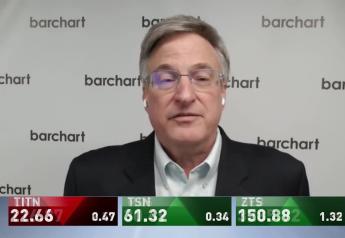Your Guide to the Emerging Renewable Diesel Market
Dan Basse's Take on Renewable Diesel
Big change is afoot. Those soybeans growing in your fields have traditionally been valued by the meal they produce and animals they feed. Soon their oil content could pad your pocketbook.
Public policy to reduce carbon emissions is fueling demand for bio-based fuels. Low Carbon Fuel Standards (LCFS) are in place in California and Oregon, and several other states are considering them. These rules call for conventional petroleum fuels, such as gasoline and diesel, to be replaced with more carbon-friendly fuels.
Enter renewable diesel. While it is a cousin of biodiesel, the two fuels are not the same. Renewable diesel, which is produced by processing fats, vegetable oils and waste cooking oils, is chemically the same as petroleum diesel and has nearly identical performance characteristics. Plus, it is 100% fuel, removing the need for blending it with diesel.
At Farm Journal we've been diving into the many implications of renewable diesel and sustainable aviation fuel. Watch, listen and read the pieces below.
The growing renewable diesel and sustainable aviation fuel industries are a social issue—not a mandated issue, says Dan Basse, president of AgResource Company.
“We need to double U.S. soybean oil supplies, going from 25 billion pounds to close to 50 billion pounds by 2024. That’s going to take an increase of U.S. crushing by about 60%,” he says. “We will need more soybean acres each year.”
Sustainable Aviation Fuel and Renewable Diesel May Be the Ticket to Eliminating U.S. Soybeans’ Dependence on China
The Biden administration is accelerating its efforts to reduce the carbon footprint of the nation’s transportation system, and as a result, soybean growers could soon cash in on a new opportunity around low carbon fuel standards (LCFS).
Chip Flory: The Domestication Of The U.S. Soybean Market
“We will start crushing for oil instead of meal by 2025 and use all that oil while stockpiling meal,” says Peter Meyer, head of grains and oilseed analytics for S&P Global Platts. “The U.S. export system will have to evolve, and that means beans and oil stay here and the meal gets exported.”
Big Oil Makes Big Bet on Soybeans as the Answer for Cleaner Energy
In a venture to produce cleaner energy, big oil is turning to soybean oil. In April, Phillips 66 announced it is securing feedstock for the company's growing portfolio of renewable fuels projects by investing in a new soybean-processing plant in Iowa. Phillips 66 isn’t alone — Love’s also made a similar announcement with Cargill.
Exclusive-Exxon, Chevron Look to Make Renewable Fuels without Costly Refinery Upgrades
U.S. oil major Exxon Mobil Corp, along with Chevron Corp, is seeking to bulk up in the burgeoning renewable fuels space by finding ways to make such products at existing facilities, sources familiar with the efforts said.
USDA to Expand Forecasts on Soyoil Use in Biofuels in May Crop Report
USDA will alter how it reports soybean oil use by biofuels producers beginning with its monthly World Agriculture Supply & Demand Estimates (WASDE) report in May. The change to the closely watched report, viewed as the global gold standard in agriculture data, comes amid rising demand for vegetable oils from producers of renewable diesel, a clean burning fuel made from soy and other fats and oils.
Pete Meyer is the head of grain and oilseed analytics at S&P Global Platts and provides a riveting rundown on the situation and future of biodiesel.
We welcome Mike Kinley, managing member of the Ag Development Group, to AgriTalk to talk about their project to build a new soy crush facility in Iowa.
Dr. Patrick Westhoff, director of the Food and Agricultural Policy Research Institute at the University of Missouri, joins us to discuss that departments new Baseline Update for U.S. Farm Income and Government Costs report.
Bill Lapp is the president of Advanced Economic Solutions and he joins us for a conversation about renewable diesel from the food end-user perspective.
We welcome Barry Coleman to AgriTalk. He is the executive director of the Northern Canola Growers Association and he gives us an education on the way canola may contribute to the production of renewable diesel fuel.







